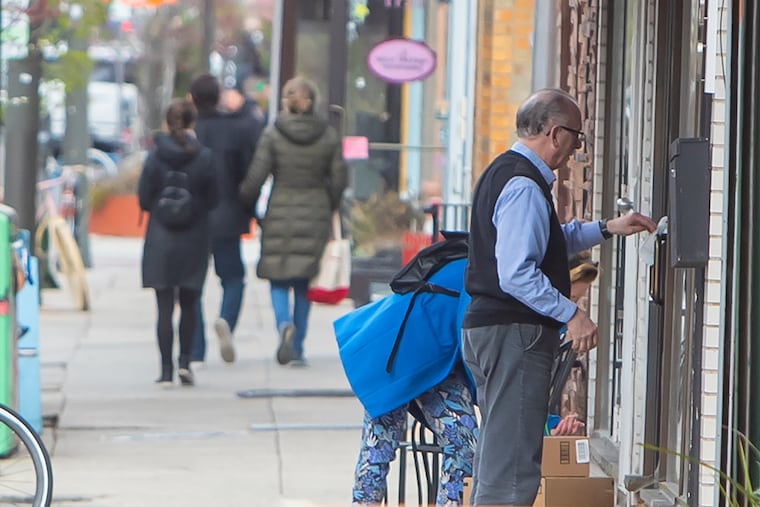Coronavirus puts Philly’s beloved small businesses at risk. Here’s how you can help save them. | Opinion
#Five4Fifty is a pledge to spend at least $5 at a small business everyday for the next 50 days (about 7 weeks, the critical window of time in the U.S.).

There’s a meme going around Instagram right now summing up the state of affairs for small businesses navigating our new COVID-19-infected reality: If you would like to know how it feels to be in hospitality during the coronavirus pandemic? Remember when the Titanic was sinking, and the band continued to play? Well, we’re the band.
It will be months before we know the true economic cost of COVID-19, but there’s no doubt small businesses and the people they employ will be affected most: your local bar and bakery, the dry-cleaners, the barbershop, all “nonessentials” that have been shut down, some of their own volition at first, the rest at the direction of government leaders. Grocery stores are open, and you don’t need to see the corona-porn posts of pillaged shelves at Target and Walmart to realize these big businesses will be OK. It’s the little guys and girls who will need support, especially minority- and immigrant-owned businesses, that will be disproportionately affected.
» READ MORE: SHARE YOUR STORY: How are you staying connected to your community amid the coronavirus outbreak?
I asked some local small business owners how the pandemic has affected their bottom lines and industries so far, and answers came back in the realm of “devastating” (Judy Ni, chef-owner, Baology) and “terrifying” (Stevie Chris, freelance photographer).
I closed a small retail business in January, by choice. Had that not been the case, I feel confident saying the coronavirus would have taken it out by spring. I wanted to do something for the small businesses in my community, so over the weekend I launched #Five4Fifty, a pledge to spend at least $5 at a small business every day for the next 50 days (about seven weeks, the critical window of time in the United States). It’s a beer, a loaf of bread, a bouquet of flowers. Don’t have $5 a day? Do $3 or $1 — every little bit will help. Don’t have the spare money at all? Telling a friend or family member is free.
You can participate in #Five4Fifty from home, as social distancing to flatten the curve has become the recommended course of action. Shop online from independent stores, subscribe to a local newspaper or magazine, buy gifts cards you can use at a later date. Restaurants, which so far are permitted to remain open for takeout and delivery, are getting creative. On Tuesday morning, East Passyunk’s Essen Bakery was delivering sesame bagels, za’atar croissants, and Jewish apple cake to customers who signed up online via its “Babkamobile.” Lalo, the Filipino restaurant at the Bourse, has instituted curbside pickup and expanded its delivery zone to 10 miles outside Center Cit y— that means adobo for Ardmore and pork belly for Packer Park.
While takeout and delivery can temporarily staunch the bleeding — before it decided to close this week, a 25% increase in online sales at Mike’s BBQ, for example, had offset a 25% decrease in in-person sales — it’s an imperfect solution. Third-party delivery services haven’t stopped charging restaurants commissions, and takeout/delivery does not address losses for tipped and hourly workers. A crisis like this underscores how threadbare the safety net is in America’s tipped-wage system — to say nothing of our exploitative health-care system — though that lesson is of little comfort to the server or bartender who depends on butts in seats to make money.
Businesses I’m seeing address this directly include Rowhouse Grocery in Newbold, which is offering a 15% discount to service-industry workers. At Kalaya in Bella Vista, chef-owner Nok Suntaranon posted a video on Instagram announcing a free family meal for anyone in the industry. Money from all gift-card purchases at Steve Cook and Mike Solomonov’s restaurants will go toward staff support. “We’ve raised $10,000 so far,” Cook told me Tuesday.
I saw a post from comedian Kate Willett on Twitter. She wrote, “If they [the federal government] don’t give relief to small businesses when we go back outside everything will be a Starbucks and NY as we know it will be entirely gone.” Though New York’s astronomical rents make businesses there uniquely vulnerable, the same sentiment could apply to Philly.
Imagine the city without Pho 75 or Metropolitan Bakery or Rival Bros. Coffee, then go support them and businesses like them through the #Five4Fifty pledge. Things are changing moment by moment, and in another week, the situation in the United States. could look more like those in Italy and France. Until then, I’ll be doing my very small part.
Adam Erace is an award-winning food and travel writer based in South Philly. He is the coauthor of Laurel: Modern American Flavors in Philadelphia and Dinner at the Club: 100 Years of Stories and Recipes From South Philly’s Palizzi Social Club.